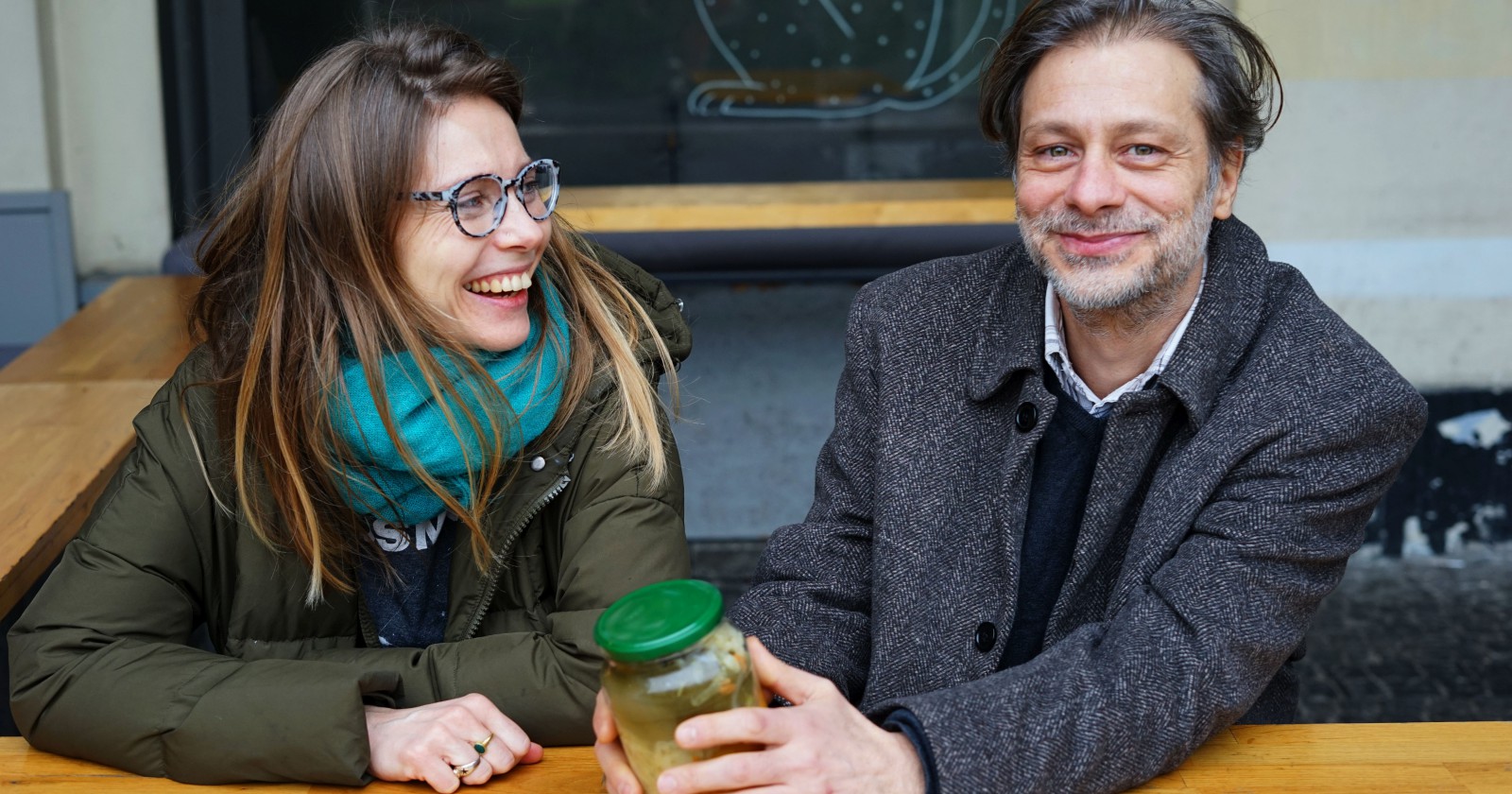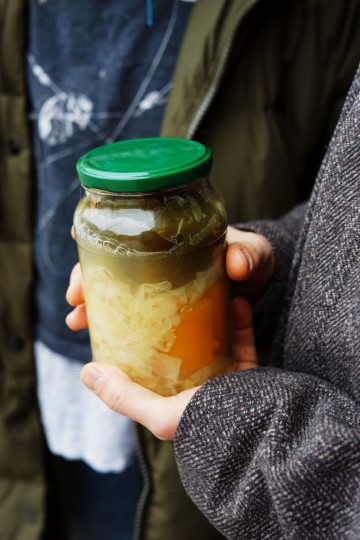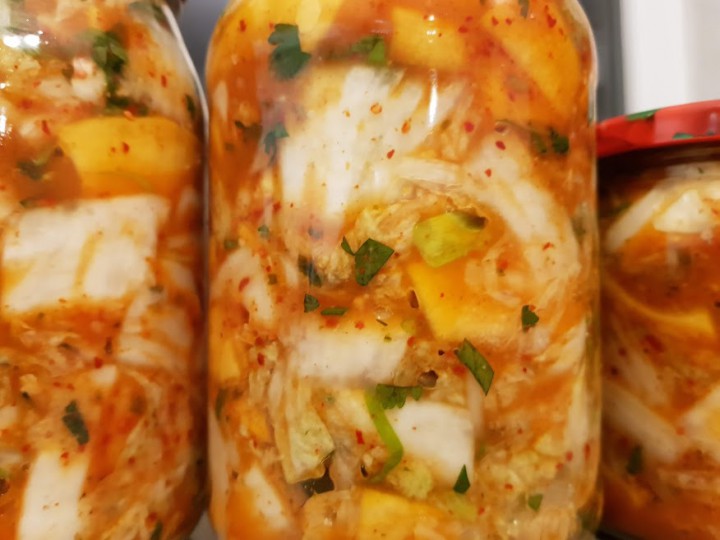
Żywy Ferment | Fermentation Is Alchemy17.01.2019
She was born in Poland, while he’s of Turkish descent. They were brought together by the peculiar, incongruous taste of fermentation: somewhat sweet, slightly salty, with a tinge of garlic or a hint of chilli. Żywy Ferment, a fermentation collective, has its own website, an online store selling pickled and fermented products, and a calendar full of pickling workshops that continue to pull crowds of fermentation enthusiasts. Join us for a conversation about the art of fermentation and the international pickling boom with Ewa Dąbrowska, founder of the organization.
Fermented products seem to be very in vogue lately. It seems that overnight everyone started making pickles. How did your journey start?
Ewa: Żywy Ferment is just my partner and me. Ozcan is from Turkey, while I’m from Poland and although it may seem that the two countries are world apart, nothing could be further from the truth. The two cultures share a number of elements, including a love of fermentation. When we met, it turned out we too shared a passion for packing flavors into jars. My family took the classic approach to fermentation—we pickled cucumbers, cabbage, but when my boyfriend told me about pickle shops that were so popular across Turkey, I decided I wanted to open something like that here, in Poland.
What’s the deal with pickle shops?
Pickle shops are small booth-stalls selling a huge variety of pickles you can pick and choose from. You step into the shop, pick up a jar, pick whatever vegetables or a mix of them you like, and then the vendor fills up the jar with brine. People in Turkey consider it a street food and eat them straight out of a jar right there on the street, like ice cream. Similar stores have been opening up across the globe, in New York City, for example
Why do people bother with pickling at all?
My guess is everything depends on the latitude of the region. People pickle stuff in Poland to have vegetables to eat in the winter. In our particular climate, we have to deal with six months of no available rest produce, so maybe this is why we have such rich pickling traditions here. Back in the day, a barrel of sauerkraut was for many the only source of vitamins during the summer. In Turkey, on the other hand, people pickle to do something with the surfeit of crops—the temperatures in Turkey are high, so vegetables spoil quite quickly. And pickling allows people to avert that spoilage.

Any significant differences between how Turks and Poles approach pickling?
Frankly, there’s a number of them. Turks prefer pickling a mix of different vegetables together in brine. The brine itself has more salt and vinegar, so Turkish pickled delicacies are salty and sweet, whereas ours are salty and a little sour.
Is pickling complicated?
When dealing with fermentation, everything seems both a discovery and a challenge, so I have to admit that it’s hard to develop a rigid framework for pickling. Fermentation seems almost an alchemical process, you never know what might happen down the line. There’s no way to do two sets pickles that would taste the same. It’s even more complicated by the fact that there’s no one proper way to ferment: some veggies, like cabbage, you can ferment in their own juices; others, like cucumbers, you can pickle in brine. You can also pickle things in honey or even buttermilk. There’s a ton of recipes out there, pickling’s more or less a freestyle affair.
What can you pickle with buttercream?
Pumpkin, for one, which gives it sensational flavor. But pickling in buttermilk is never easy. Some people say it might actually be dangerous—as there is a chance that the fermentation process will yield the lethal botulin toxin. Something can always go wrong. Even if we follow the exact same process with twenty jars, easily five can go bad, with either setting in or the fermentation fizzling out. You need to remember that fermentation is not something you can fully control, because the microbiome will develop differently in each jar. And it’s the diversity of the populations making up the microbiome that will decide the flavor and the softness of the fruits and vegetables we pickle. You never know which species of bacteria will come out on top. You also need to keep in mind the rules of storing and handling pickled foods—once opened, a jar needs to be refrigerated and you can’t rummage around it with dirty hands.
Are there any strict rules or recipes you got to stick with when pickling?
Your pickling area and your equipment needs to be pretty clean, you can’t have any undesirable bacterial or viral contaminants. I fought long and hard against pickling in latex gloves, I wanted to feel the fruits and veggies I was working with. But now, sadly, I know that it’s necessary.
Do you experiment with your pickles or prefer to stick to tried and true recipes?
I always like to add something wild to my jars, but Ozcan’s quite the opposite, he can’t see the point. According to Turkish traditions, pickles have to be prepared exactly according to the recipe, which often gets passed down from generation to generation. I guess playing music to our pickles is the wildest thing we’ve done. At some point we thought that if people can play Mozart to grapes in vineyards, then maybe we should be playing some cool tunes to our jars. But we’re very choosy when it comes to crafting our fermentation playlists! (Laughter)
It’s the middle of winter. What’s the skinny on pickling in January?
Back in the day, you only pickled what was currently in season. Nowadays, because some veggies are available all year round, you can pickle pretty much whenever you want. But we try to stick to pickling in season. Recently, I’ve been particularly partial to pickling garlic which becomes green or even turquoise once it’s fermented. I’ve also been experimenting with pickling it in honey, because it’s a natural antibiotic. The garlic-honey combo is a veritable wellspring of vitamins.

What was the wildest pickle you made?
Pears, I think. Once fermented, they change their shape and flavor. Recently, I’ve also managed to pickle a pineapple and it was incredibly good. In pickles like that, the sweetness of the fruit blends with the acidity of the brine, the tinge of garlic, chilli, and vinegar. Taken together, all these elements produce very unusual, unobvious flavors.
What happened to make fermentation such an overnight sensation?
I think it’s a result of the slow food trend and the growing focus on what it is we put on our plates. Most food available in stores is highly processes and quite expensive. Pickled foods, on the other hand, are like our local, Polish superfood—they’re rich in good bacteria which help with digestion. Obviously, you can get too much of a good thing, so we need to pace ourselves with pickles, but on the other hand my family and I eat pickled foods every single day and we barely get sick. Pickles not only carry vitamins, but also loads of minerals in forms that are much more bioavailable. Just look at fermented soybeans, which are one of the very few sources of vitamin K. I don’t know whether pickling’s for everyone, but I do know that more and more people will be munching on pickled foods in years to come. If they’re healthy and you can eat them with everything, then I think they’re the future of food, without question. I even eat pickled foods with my breakfast. Kimchi with pancakes give you a kick like nothing else.
see also
- Chernobyl—History and Artistic License. Is the New HBO Hit Show Historically Accurate?

Opinions
Chernobyl—History and Artistic License. Is the New HBO Hit Show Historically Accurate?
- Sylvester Stallone In Terminator 2—the Amazing and Terrifying Power of Deepfakes
News
Sylvester Stallone In Terminator 2—the Amazing and Terrifying Power of Deepfakes
- First Gym for Esports Athletes to Open in Tokyo

News
First Gym for Esports Athletes to Open in Tokyo
- Environmentally-Friendly School to Receive Prestigious RIBA Award

News
Environmentally-Friendly School to Receive Prestigious RIBA Award
discover playlists
-
Cotygodniowy przegląd teledysków
 73
73Cotygodniowy przegląd teledysków
-
Instagram Stories PYD 2020
 02
02Instagram Stories PYD 2020
-
Seria archiwalnych koncertów Metalliki
 07
07Seria archiwalnych koncertów Metalliki
-
Walker Dialogues and Film Retrospectives: The First Thirty Years
 12
12Walker Dialogues and Film Retrospectives: The First Thirty Years
